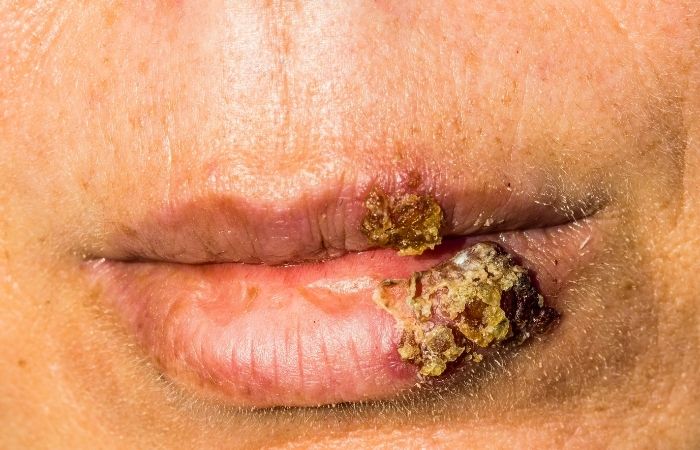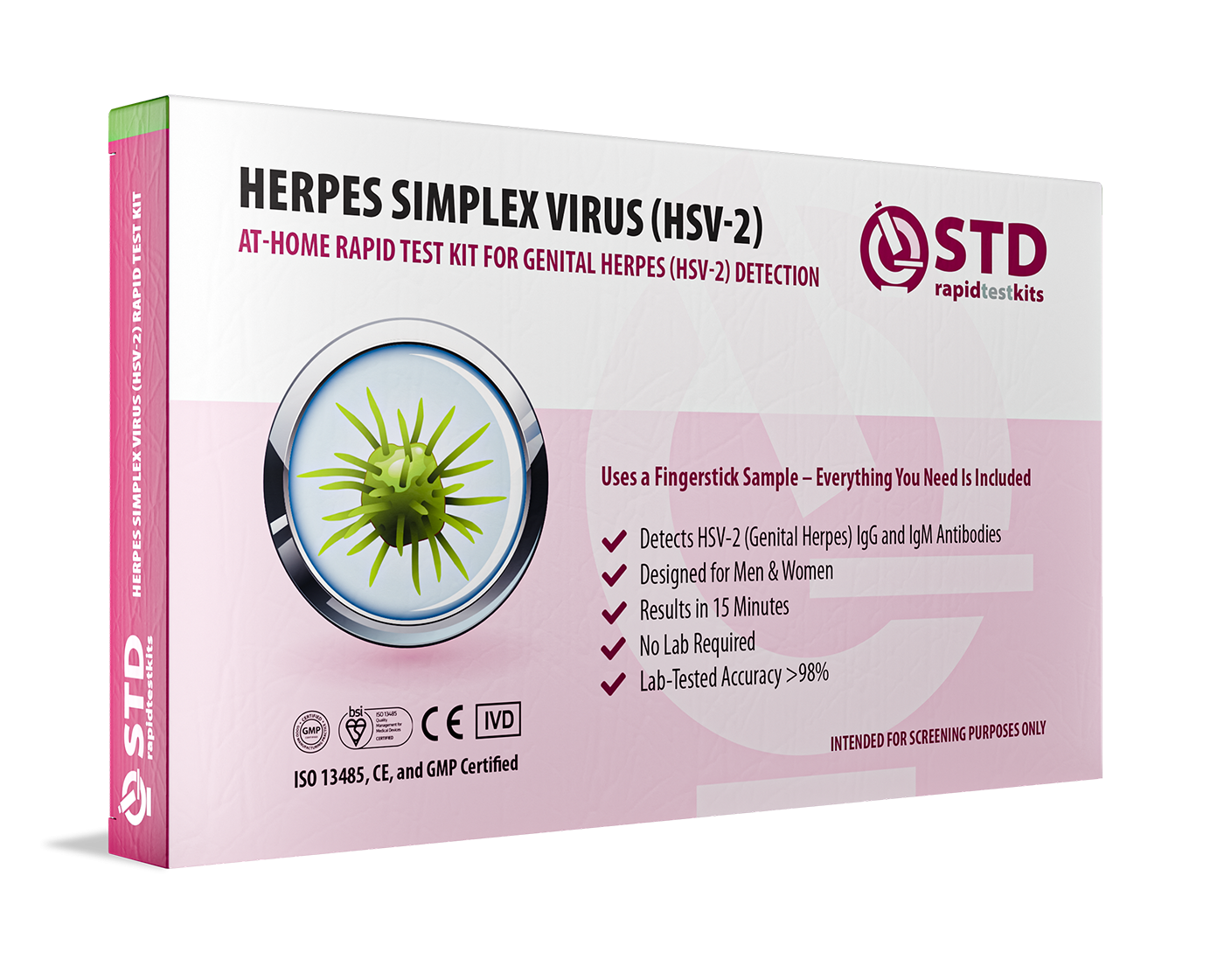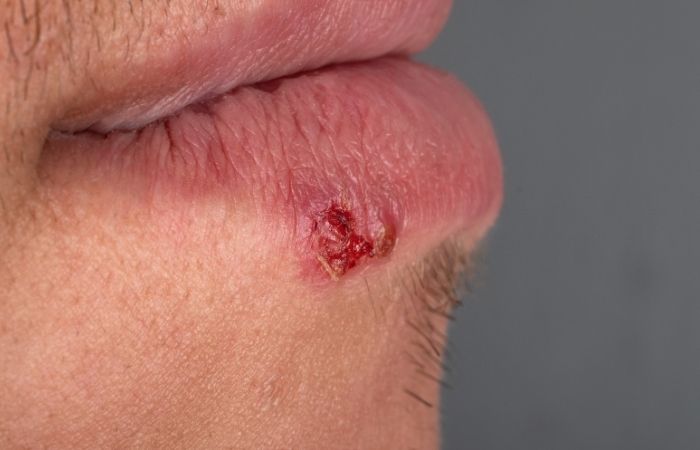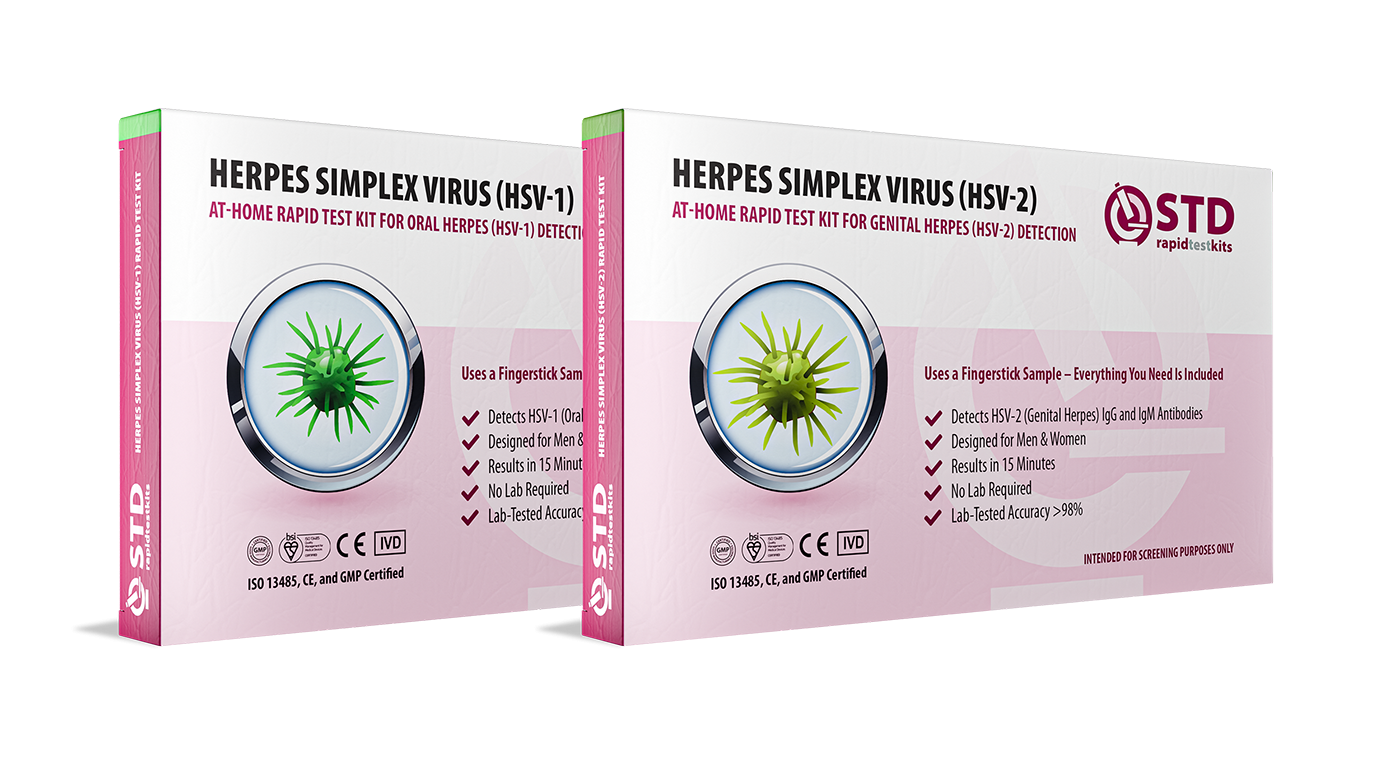Quick Answer: Yes, you can get herpes without having penetrative sex. HSV-1 and HSV-2 spread through skin-to-skin contact, oral sex, kissing, and even when no symptoms are present.
This Is How I Found Out
Sasha, 23, had never had vaginal, anal, or even oral sex. But after noticing a stinging sensation while wiping one day, she went to the campus clinic, more out of anxiety than certainty. What she thought might be a yeast infection turned out to be something else entirely.
“When the nurse said ‘It looks like herpes,’ I laughed. I said, ‘That’s not possible. I’ve never had sex.’”
She tested positive for HSV-2, the strain most commonly associated with genital herpes. And suddenly, everything she thought she knew about sexual safety collapsed.

People are also reading: The Big 10: Most Common STDs Ranked by Risk, Symptoms, and How to Spot Them
What Even , Counts, as Sex?
Many people associate STDs strictly with penis-in-vagina or penis-in-anus penetration. But viruses like herpes don’t care about technicalities. They spread through skin-to-skin contact, especially when mucous membranes are involved (genitals, mouth, anus).
You can get genital herpes from:
- Oral sex: HSV-1 from a partner with cold sores
- Genital grinding: Skin contact with no penetration
- Kissing: If the partner has oral HSV-1
- Shared sex toys: Especially without cleaning between partners
Herpes doesn’t require ejaculation, penetration, or even a visible sore to spread. That’s part of what makes it so easy to contract, and so misunderstood.
Asymptomatic Transmission: The Invisible Threat
You’ve probably heard it before: “You’ll know if you have herpes.” But that’s a lie. Most people with herpes never have visible symptoms. They don’t know they’re contagious. They feel healthy. They pass it to partners anyway.
This is called asymptomatic viral shedding. It means the herpes virus can be active and spreadable even when there’s no outbreak, no sores, no tingling, no warning. In fact, over 80% of people with HSV-2 don’t even know they have it, according to the CDC.
“I’d only ever kissed him. We never even got past making out,” Sasha remembers. “He told me later he gets cold sores, but had no idea they could lead to genital herpes.”
Here’s how it happens:
- A partner with oral HSV-1 performs oral sex during a “shedding” phase
- The virus enters your body through microscopic skin tears or mucous membranes
- Symptoms may appear days, weeks, or months later, or not at all
This isn’t about blame. It’s about biology. Herpes doesn’t always play by the rules, and sex ed rarely tells the whole story.
“But I’m a Virgin…”, And Still at Risk
Virginity is a cultural construct, not a medical one. Plenty of people consider themselves “virgins” even after engaging in oral sex, mutual masturbation, or genital-to-genital contact. None of those need to involve penetration, but all can transmit herpes.
You can also contract herpes:
- From a shared razor or towel (rare, but possible)
- During childhood from a family member’s cold sore (often overlooked)
- Through kissing alone if your partner has oral herpes
The virus doesn’t care if you’ve “gone all the way.” It only cares about skin, cells, and timing. Which is why your story, and Sasha’s, isn’t rare. It’s just under-discussed.
Check Your STD Status in Minutes
Test at Home with Remedium7-in-1 STD Test Kit

 For Men & Women
For Men & Women Results in Minutes
Results in Minutes No Lab Needed
No Lab Needed Private & Discreet
Private & DiscreetOrder Now $129.00 $343.00
For all 7 tests
Shame Isn’t a Symptom, But It Feels Like One
Getting diagnosed with herpes when you’ve never had “sex” doesn’t just bring confusion, it brings shame. Not because the virus is dangerous (it’s not, in most cases), but because society still weaponizes sexuality, especially for women, queer people, and anyone who doesn’t fit the mainstream mold.
Herpes feels like a punchline. It shouldn’t. It’s a skin virus. It doesn’t mean you’re dirty, reckless, or broken. And it doesn’t care if you’re straight, celibate, religious, or “careful.”
“I couldn’t tell anyone. I felt like I’d done something wrong, even though I knew I hadn’t,” Sasha says. “It was the loneliest feeling I’ve ever had.”
But Sasha’s not alone. You’re not alone. Tens of millions of people carry HSV-1 or HSV-2. Many got it from a kiss. From a loving partner. From a one-time mistake. Or from something that didn’t feel like “sex” at all.
The truth? Herpes is manageable. You can still have relationships. You can still date, love, have incredible sex. You just need to know your status, learn about transmission, and communicate with partners.
If you’ve recently been diagnosed, or think you might have herpes, breathe. Then act. Testing is the first step toward clarity, not punishment.
The Truth Your Sex Ed Skipped
Most of us were taught that sex = intercourse. That STDs only happen when you “go all the way.” That condoms solve everything. None of that is entirely true. Especially with herpes.
Herpes can’t be fully prevented by condoms. They reduce risk but don’t eliminate it, because the virus lives on skin beyond the areas condoms cover. What really helps is:
- Knowing your partner’s status
- Recognizing early symptoms (tingling, itching, burning)
- Testing regularly, whether or not you’re “sexually active”
- Talking openly about cold sores and STI history
Herpes doesn’t mean your life is over. It means it’s time to get informed.
“It Doesn’t Look Like Anything”, When Herpes Is Invisible
You might think herpes always looks like angry blisters. But the truth is, most people never get those dramatic textbook outbreaks. Instead, symptoms can be so subtle they get misdiagnosed, or missed entirely.
Common early signs of genital herpes that aren’t always obvious:
-
- Redness or itching mistaken for shaving irritation
- Tiny cracks in the skin or paper-cut-like lesions

People are also reading: STDs That Hide in Saliva and Under Nails
What Testing Can, and Can’t, Tell You
Not all STD tests check for herpes. And even when they do, results can be murky. Here’s what you need to know:
- Swab tests: Most accurate during an active outbreak
- Blood tests (IgG): Can detect antibodies but can’t always pinpoint where the infection is (oral vs genital)
- False positives and negatives: Possible, especially early after exposure
If you think you’ve been exposed, or are just unsure, don’t guess. Use a home herpes test that includes both HSV-1 and HSV-2. Follow up with a provider if anything’s unclear.
And remember: A positive test doesn’t mean you’re dirty. It means you’re informed.
- Stinging or burning during urination
- Flu-like symptoms (fever, body aches, swollen glands)
“My first outbreak felt like a yeast infection and razor burn at the same time, but no sores. I didn’t even think to test for herpes.”, Rina, 25
Sometimes herpes shows up once, then disappears for years. Other times, it flares with stress, illness, or hormonal shifts. The unpredictability can be maddening, but it’s also manageable.
Your Body, Your Boundaries, Your Call
Herpes can shake your confidence. Especially when it shows up in a body that’s never “gone all the way.” But your story doesn’t end here. It just got more honest. More real. More you.
There’s power in understanding your body. In setting boundaries based on knowledge, not fear. And in realizing that herpes doesn’t define your value, your sexuality, or your future.
“Once I stopped seeing it as punishment and started seeing it as information, everything changed.”, Sasha
You can still flirt. Date. Fall in love. Get married. Have kids. You just do it with better communication and safer sex skills than most people ever learn in school.
Why Doctors Still Miss This
Even some medical providers downplay or misunderstand herpes, especially when you say you haven’t had “real sex.” You might hear, “It’s probably just irritation,” or “You don’t need to worry if there are no sores.” But that’s outdated thinking.
Herpes can present subtly. And because testing isn’t standard (unless requested), many cases get dismissed or misdiagnosed. That’s especially true for people who:
- Haven’t had penetrative sex
- Are assigned female at birth and present with vaginal symptoms
- Don’t report a visible lesion
“I went to three clinics. Everyone said ‘yeast infection.’ One finally swabbed, and it came back HSV-2.” , Leah, 24
You know your body. If something feels off, trust that instinct. And if one provider gaslights you? Find another.
Check Your STD Status in Minutes
Test at Home with RemediumGenital Herpes Test Kit

 For Men & Women
For Men & Women Results in Minutes
Results in Minutes No Lab Needed
No Lab Needed Private & Discreet
Private & DiscreetOrder Now $45.99 $49.00
Why “Clean” Is a Dirty Word
How many times have you heard it? “Don’t worry, I’m clean.” It sounds reassuring, but it’s actually dangerous. Saying someone is “clean” implies that people with herpes, or any STD, are dirty. It reinforces stigma, silences disclosure, and spreads misinformation.
Being “clean” just means someone hasn’t tested, or hasn’t tested recently. It doesn’t guarantee safety. It doesn’t account for herpes’ silent shedding. And it doesn’t make you immune.
Instead of asking, “Are you clean?” ask:
- “When was your last STD test?”
- “Have you ever had a cold sore?”
- “Have you ever tested specifically for herpes?”
Sexual health is about facts, not labels.
Yes, You Can Still Have Sex
Getting diagnosed with herpes can freeze your sex life, temporarily. The fear of disclosure. The shame. The worry of rejection. It’s real. But so is the path forward.
People with herpes have amazing sex. They also have loving relationships, long-term partners, casual flings, one-night stands, and everything in between.
What changes is awareness. Communication. Planning. And that actually makes sex safer, not worse.
- Use condoms: Lowers risk but doesn’t eliminate it
- Take antivirals: Suppresses the virus, reduces shedding
- Disclose honestly: Most people respond better than you’d expect
- Know your triggers: Stress, illness, hormones can prompt outbreaks
Herpes doesn’t end your sex life. It just adds a layer of responsibility, like every adult relationship should.
Cold Sores Aren’t Cute, They’re Contagious
We’ve normalized cold sores to the point where no one flinches at them. But they’re herpes. HSV-1 to be exact. And they’re highly contagious, even without kissing.
If someone has a visible cold sore, they should avoid:
- Kissing
- Oral sex (giving OR receiving)
- Sharing drinks, lip balm, towels
HSV-1 can cause genital herpes through oral sex. In fact, it’s now responsible for more new genital herpes cases than HSV-2 in some populations, especially young people.
Cold sores aren’t harmless. But with care and education, they don’t have to be terrifying either.

People are also reading: The Alarming Rise of HPV and Herpes Among Young Koreans
Herpes and Mental Health: The Silent Crash
Herpes doesn’t just affect your skin, it can wreck your mind. Anxiety. Depression. Suicidal thoughts. That’s what stigma does. It makes you feel like you’re the only one.
You’re not.
“I cried for three days straight. I thought no one would ever touch me again.” , Kai, 27
This diagnosis brings a grief cycle. Shock. Denial. Anger. Shame. Then, eventually, acceptance. But that journey takes support. Therapy. Online forums. Honest conversations. Maybe even time away from dating to recalibrate your self-worth.
If you’re struggling, talk to someone. A friend. A doctor. A therapist.
Dating After Diagnosis: What Actually Happens
The hardest part isn’t the virus. It’s the disclosure. The fear of rejection. But most people with herpes are surprised by how partners actually respond.
Not everyone will stay. But the right people will listen. Ask questions. Care. They might even say, “Thanks for telling me. I had no idea this was so common.”
Here’s what can help:
- Disclose early, but not on the first date unless it feels right
- Use calm, direct language: “I have genital herpes. It’s managed with meds and I haven’t had an outbreak in X months.”
- Offer information: “I’m happy to answer questions. Here’s a site I trust.”
- Don’t apologize for having it. Just share.
Herpes doesn’t filter out love. It filters out people who don’t deserve you.
When You Test Positive… and Feel Nothing
For many, herpes arrives as a positive test, and that’s it. No sores. No outbreak. No obvious signs. Just a lab result that changes everything.
This can create an emotional disconnect: “Am I really infected if I don’t feel sick?” The answer is yes. But it doesn’t mean you’re contagious all the time. Or that you’ll suddenly develop symptoms.
Asymptomatic herpes is common. It still deserves management. Antivirals, safer sex practices, and regular check-ins with a provider help reduce risk and give peace of mind.
You’re not a ticking time bomb. You’re a person with new knowledge, and new power.
Check Your STD Status in Minutes
Test at Home with RemediumGenital & Oral Herpes Test Kit

 For Men & Women
For Men & Women Results in Minutes
Results in Minutes No Lab Needed
No Lab Needed Private & Discreet
Private & DiscreetOrder Now $75.00 $98.00
For all 2 tests
Taking Back Control Starts with Testing
Whether you have symptoms or not, the first step to peace is clarity. Knowing your status is the most empowering move you can make.
This combo STD test kit checks for herpes, chlamydia, gonorrhea, and more. No waiting rooms. No judgment. Just you, your results, and a path forward.
You deserve that. You deserve answers. And you deserve to write the rest of your story, your way.
FAQs
1. Can you really get herpes without having sex?
Yes. Herpes spreads through skin-to-skin contact, including kissing, oral sex, and genital rubbing, no penetration needed.
2. How common is it to get herpes from kissing?
Very common. HSV-1, the virus behind cold sores, can be transmitted through a single kiss, even if no sore is visible.
3. Can I get genital herpes if I'm a virgin?
Yes. Virginity doesn’t protect you from STDs. Oral sex or non-penetrative contact can transmit herpes.
4. What if my partner doesn’t have symptoms?
They can still transmit herpes. Asymptomatic shedding is how most people get it, when their partner has no idea they’re contagious.
5. Is oral herpes the same as genital herpes?
Not exactly. But HSV-1 (oral) can cause genital infections through oral sex. HSV-2 typically causes genital herpes but can appear orally.
6. Does herpes mean I cheated or was cheated on?
No. The virus can stay dormant for months or years. It doesn’t mean recent infidelity, it means someone had it, maybe unknowingly.
7. Can herpes be cured?
No. But it can be managed with antivirals. Outbreaks become less frequent over time, and transmission can be reduced significantly.
8. Do I have to tell future partners?
Ethically, yes. It builds trust and protects them. With the right conversation, most partners respond with compassion.
9. Will I ever date again?
Absolutely. Millions of people with herpes have healthy relationships. Knowledge and honesty are powerful tools.
10. Where can I get tested discreetly?
This at-home herpes test lets you check your status privately, accurately, and without judgment.
Before You Panic, Here’s What to Do Next
This isn’t a horror story. It’s a wake-up call. Herpes doesn’t mean the end of your sexual story, it means it’s time to learn the truth about your body, your boundaries, and your biology.
You are not broken. You are not alone. And you’re not the first person to say, “I got herpes and I never even had sex.”
Don’t wait and spiral, get tested. This discreet combo test kit checks for herpes, chlamydia, gonorrhea, and more, all from home.
Sources
1. Planned Parenthood – “I Have Herpes, But I’m a Virgin. How is This Possible?”
3. Ro – “Can You Get Herpes Without Having Sex?”
4. Verywell Health – “Oral and Genital Herpes”
5. Verywell Health – “Can You Get an STI from Fingering?”
6. Everlywell – “How Do You Get HSV Without Being Sexually Active?”










